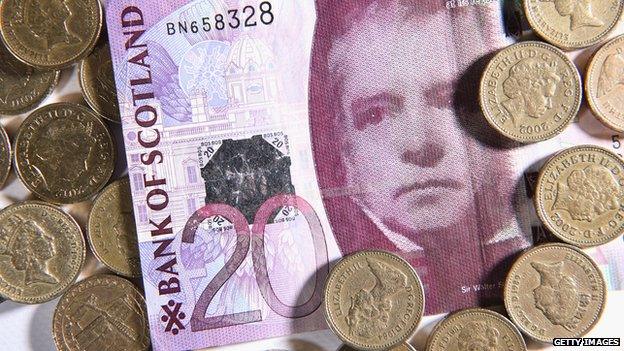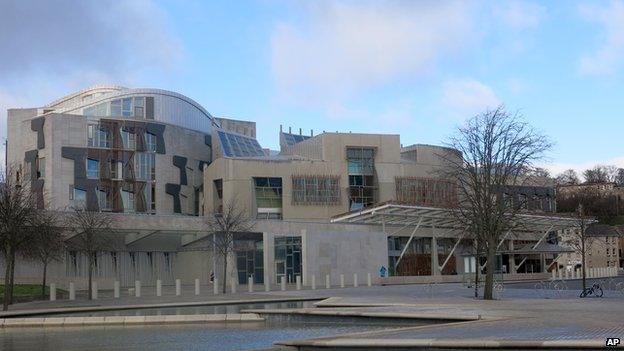Will the Tories meet the SNP pledge on fiscal independence?
- Published
- comments

Might David Cameron be about to make a "big, open and comprehensive offer" to the Scottish National Party? An idea circulating among ministers in Westminster right now is that the new government should offer to meet a key demand of the SNP - "full fiscal autonomy" (FFA).
This is the idea (also known as "full fiscal responsibility") that Scottish spending should be paid for out of Scottish taxation. Holyrood should control the local tax collectors and purse strings alike. This would be a big step beyond the Smith Commission, which has already put forward plans for further devolution of tax and spending responsibilities.
It is also seen as a step towards full independence. So why might senior politicians in the Conservative and Unionist Party support it. And, rather than doing it gradually, as the SNP proposes, might they seek to rush it? Furthermore, might the SNP seek to resist this dose of independence?
The unionist rationale for FFA is that it would normalise Scottish politics and help to reflect Scottish wishes, external within the union. At the moment, Holyrood spends but doesn't tax. So, some top Tories think, SNP ministers can claim credit for things it spends on (like cutting tuition fees) while blaming others for its unpopular decisions (like cutting student grants). The first minister giveth and the prime minister taketh away.
These Tories also think the Smith Commission plans, which envisage devolving more tax powers, might not do enough to change that equation. So they want to give the Scottish government more powers. Indeed, some in Westminster believe that, as soon as the buck stops in Holyrood as well as the plaudits, it might "stuff" the SNP.
The economic consequences of FFA
That is partly because FFA would create some tough decisions for the Holyrood administration. At the moment, Scotland's fiscal position is supported with increasing amounts of money from the rest of the UK as the oil fields run down. The country is also older than the rest of the UK - some of its age-related costs are higher and rising faster than the rest of Britain.
To take a hypothetical scenario that shows this up: the Institute for Fiscal Studies (IFS) estimates that, in 2019-20, the UK as a whole expects to be running a modest surplus and for the economy to be ticking along - neither too hot nor cold. If Scotland were to switch to FFA that year and kept its current spending and tax levels, it would run a deficit of 4.6% of its local GDP.
So Scotland would need to raise taxes totalling £9.6bn to maintain the same budgetary position as the rest of the UK without cuts. That is, conversely, the amount of money that the Treasury would save from this arrangement. FFA means a squeeze for Scotland and a windfall for the rest of the UK.

Fiscal independence could present both benefits and challenges to Scotland and the SNP
That's a lot of money. Scotland's public sector spending was about £65bn in 2013-14. To give you a sense of scale, all of the VAT in Scotland will probably bring in about £12bn in 2019-20. If you seek to make the fiscal adjustment just by cutting spending, even shutting down the entire education system wouldn't get you there.
Now Scotland might not need to close the £9.7bn gap in full. It could, presumably, run a slightly looser fiscal policy. And the SNP wants to edge to FFA slowly.
My scenario was illustrative of the problem, rather than a real path. But the key point is that FFA would certainly require less spending or tax rises than the rest of the UK as part of any transition. It needs to adjust to a smaller tax base and policies to spur growth are, at best, small, slow-acting and uncertain.
That might all be tough for the SNP coalition in Holyrood to hold together: it has, after all, sought to lead from an "anti-austerity" position.
The end of the union?
Still, some Tories think that the SNP might be tempted to go for it. After all, after jumping to FFA, they would soak up some pain but would also make it harder to argue for the union. If Scotland is self-reliant, why stay in the union?
Some London schemers propose a sunset clause - say, that Holyrood would need to vote to renew the experimental arrangement a few years down the line or they could opt back into a (more generous) UK-wide spending formula.

Could Holyrood find itself in a war of words with Westminster?
Their key idea is that the SNP should be made to persevere just long enough to take heat for cutting spending in Scotland just as England, Wales and Northern Ireland started to spend more. Indeed, just as the rest of the UK got to spend the money that they saved from FFA .
Would this all work? The political consequences of this plan would depend on whether Scots would see FFA as what the SNP wanted.
That's not clear: the SNP could quibble over the fiscal rules for Scotland, the timescale and the contribution it would need to make to, say, defence. The party could always find reason to claim the plan on offer isn't what they wanted.
If the SNP were to tell everyone it's not what they meant, this exercise in giving the SNP what they say they were after might simply turn into "Tory cuts imposed from Westminster". If that charge were to stick, rather than shooting the nationalist grouse, it could simply lead to more anti-Westminster grousing. So that is a big risk.
Still, FFA might get put on the table, in part because it would place the SNP in the awkward position of rejecting an offer of devo-max when it was keen to recommend near-immediate independence only last year. And that might create a problem for them - not least with their fired-up activists and their new MPs.